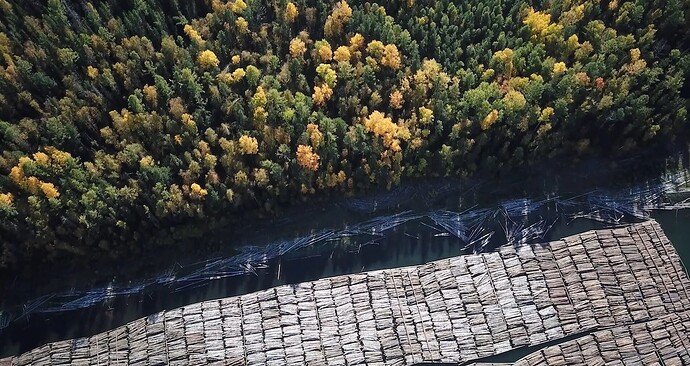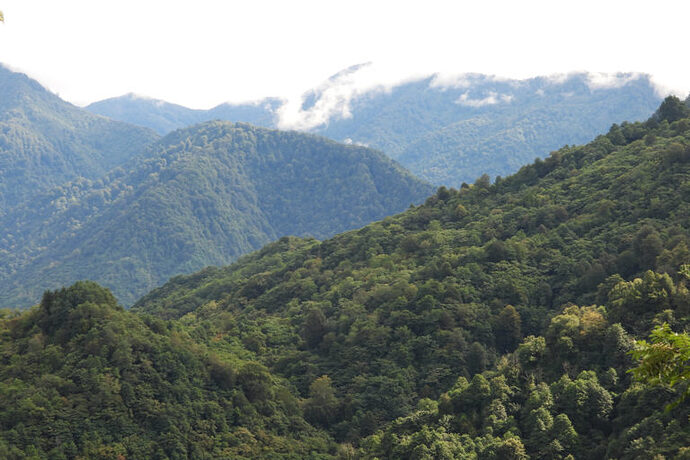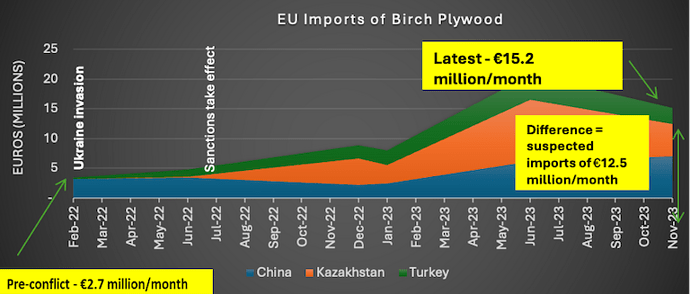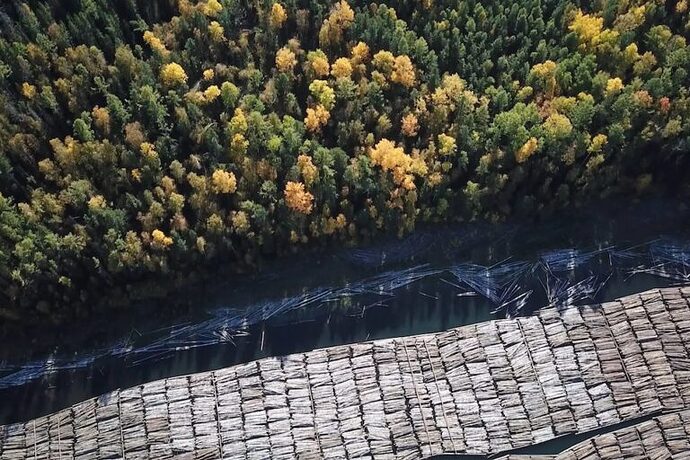- U.S. President Joe Biden responded to the death of dissident Aleksei Navalny with new sanctions that target hundreds of Russian entities and individuals, but these could go further in key areas that are also good for the planet.
- Timber represents more than half of all remaining U.S. imports of Russian goods: all of Russia’s vast forests are state-owned, and some are even under control of its military. Customs data show the U.S. has imported close to $2 billion of timber from Russian companies since the war began.
- “The U.S. should immediately bar Russian timber, pulp & paper imports, as the E.U. and U.K. have already done,” a new op-ed argues.
- This post is a commentary. The views expressed are those of the authors, not necessarily Mongabay.
Russia’s dictator Vladimir Putin has seemingly just had jailed opposition leader Aleksei Navalny assassinated. Navalny incarnated the best chance for democracy and human rights in Russia. He was a beacon of hope; a bright light in the darkness of corruption and violence that characterizes Putin’s Russia. His death is a tragedy that demands robust responses from world leaders – especially from the E.U. and from U.S. President Joe Biden, who had long warned that Putin would face devastating consequences if Navalny were to die in prison.
The new U.S. sanctions announced Friday, targeting hundreds of entities and individuals, are a sign that his administration will live up to its word – but they could go further in key areas.
We propose a response that would simultaneously teach Putin a clear and painful lesson, and help save the planet from climate change.
The U.S. should immediately bar Russian timber, pulp & paper imports, as the E.U. and U.K. have already done.
Amur tigers are among the creatures found in Russia’s taiga forest habitat. Image courtesy of WCS Russia & Sikhote-Alin Reserve.
Why is this crucial? Because timber represents more than half of all remaining U.S. imports of Russian goods, in terms of number of shipments. All of Russia’s forests are state-owned, with dues from logging flowing to it. Some forests are even under control of Russia’s military, which is also allowed to log and sell timber in its forests. Since the war began, U.S. Customs data show the nation has imported close to $2 billion of timber from Russian companies – for birch plywood alone.
Much of this may help finance Russia’s war machine in Ukraine, and help prop up Putin’s rule. These sales also enrich his cronies. Giant Russian plywood firms like Sveza, owned by oligarch Alexei Mordashov, who met with Putin on the day of the Ukraine invasion, are some of the largest suppliers of this wood. Together, Mordashov and other ‘timber oligarchs’ close to Putin control a chunk of Russian forest the size of France.
Timber is one of Russia’s largest industries after oil and gas. This is not small potatoes.
That’s why the Ukrainian Parliament has specifically called on friendly countries including the United States to sanction Russian timber, in a resolution passed in May last year. A diverse coalition of 130 non-government organizations from around the world has echoed this call. Leading unions in the US such as the International Association of Machinists and Aerospace Workers (IAM) have also repeated these calls. Last Thursday, leading Ukrainian environmental NGOs made a direct appeal to the USA to expand U.S. sanctions to Russian timber imports.
Besides their value to Putin and his cronies, Russia’s forests hold a crucial key to saving the planet.
Russian Federation forests can make or break things for the future of humanity according to the FAO, as they make up around 22% of the Earth’s forests – and sequester far more carbon than was previously reported, according to scientists published in Nature. Russia’s vast boreal forests, also known as the taiga, are the largest forested region on Earth and the country is, perhaps consequently, the world’s largest timber exporter.
See related: Nature-based recovery needed for Ukraine’s damaged protected areas
The biodiverse Caucasus Mountains span Russia, Georgia and Azerbaijan. Most of the northern slopes of this forested mountain range are within Russia. Image courtesy of Ding Li Yong.
Covering an area of 12 million square kilometers, these forests are even larger than the Amazon and have been estimated to store about half of the northern hemisphere’s carbon. Besides serving as lungs of our planet, Russian forests are home to spectacular biodiversity. Brown bear, wolves, elk and sable (a weasel-like mammal whose image adorns flags and coats of arms in Siberia) wander in these sprawling forests, while white-tailed eagles soar above them. The largest tiger in the world, the endangered Siberian tiger is at home here – Russian forests are the habitat of a gobsmacking 10% of the world’s wild tigers. They are also home to a diverse array of Indigenous tribes – some like the Sakha and Komi have their own republics within Russia. The environmental degradation caused by logging and other industrial activity threaten their way of life.
President Biden is not the only one who should act decisively on Russian timber to help save the planet while also thwarting Putin’s war machine: Europeans and Brits must step up too.
The U.K. and E.U. should create a special task force to properly enforce their existing bans on Russian timber, pulp & paper imports. These sanctions are being flouted at scale, with banned Russian products rerouted in vast quantities via Turkey and other complicit states. E.U. law enforcement in particular must step up to genuinely interdict Russian products and starve Putin’s war machine of the dollars Putin so desperately craves.
Research suggests that these circumventions are resulting in timber worth almost $13 million from countries like Kazakhstan, China and Turkey entering the E.U. each month, much of it, as tip offs from industry insiders suggest, also linked to oligarch-owned firms. Even the E.U. has officially acknowledged there’s an issue, by opening an investigation. Investigating is not enough. We need robust action, and we need it now.
Though officially banned, Russian exports of plywood have been routed to E.U. buyers via intermediaries like China, Kazakhstan, and Turkey since the war began. Graphic courtesy of Earthsight.
Together, the E.U., U.S., and U.K. could further tighten the noose by pressuring South Korea to stop accepting Russian woody biomass used to make energy.
Looking to Russia’s co-aggressor Belarus, the E.U. would do well to finally ban its direct imports of furniture from Lukashenko’s torture-stained regime, which its recently announced 13th package of sanctions has disappointingly failed to do. The country’s timber industry has been dubbed ‘Lukashenko’s last gold mine’ and the E.U. has given no explanation for why it has failed to ban furniture made in these ‘mines’ in recent rounds of sanctions.
In 2023 alone, the bloc imported more than $108 million worth of Belarusian furniture, with Poland and Germany responsible for much of that. Just ahead of Belarus’s parliamentary elections this past weekend, the first since the rigged elections of 2020, former Belarusian political prisoners, E.U. parliamentarians and rights groups denounced the trade afresh. The U.S. sanctioned Belarus’s state wood-processing company Bellesbumprom in December last year, and the E.U. must follow suit by banning the trade completely.
Belarus is home to some of Europe’s last primeval forests which are important carbon sinks, absorbing an estimated 35 million tons of CO2 annually. They too face terrible threats from logging tied to government corruption and abuse. As in Russia, Belarus’s forests are state-owned. Belarus’s prison service is the country’s largest timber company, and uses the forced labor of 8,000 inmates (including political prisoners) who slave away in conditions that have been likened to Stalin’s gulags, making products with wood sourced from within Belarus’s unique national parks.
Russia’s vast boreal forest is owned by the state and extensively logged. Image courtesy of Earthsight.
Those parks are under the direct control of the Presidential Property Management Directorate (PPMD), essentially the private slush fund of the dictator Lukashenko. Some of these forests were run until recently by his right-hand man, Viktor Sheiman, long accused by the E.U. of ‘disappearing’ the president’s political opponents. Over 1 million cubic meters of logs are cut in Belarus’s protected areas annually, even deforesting the Belarusian portion of the world-famous Bialowieza Forest, home to rare European bison, lynx and wolves.
Besides bold moves in the timber space, there’s another pack of actions that could save the planet and weaken Putin: The U.S., U.K., and E.U. could also urgently create a high-level task force to tighten the noose on Russian oil and gas exports, empowered to take every measure possible to restrict Russia’s fossil fuel clients and thus weaken and impoverish Putin.
The famous adage, “Russia is a gas station with nukes” has never been truer, and this means gas is Russia’s Achilles heel. The so-called ‘refining loophole’ that allows Russian oil refined in third countries to be legally imported to the U.K. and U.S. must be immediately closed. It is estimated that the sale of refined oil in the U.S. alone generated $180 million for the Kremlin last year. That can buy around 8,600 military drones of the type Russia uses to bomb Ukraine.
It’s time to focus like lasers on Putin’s weaknesses and support Ukraine, while also helping to protect our planet for future generations.




